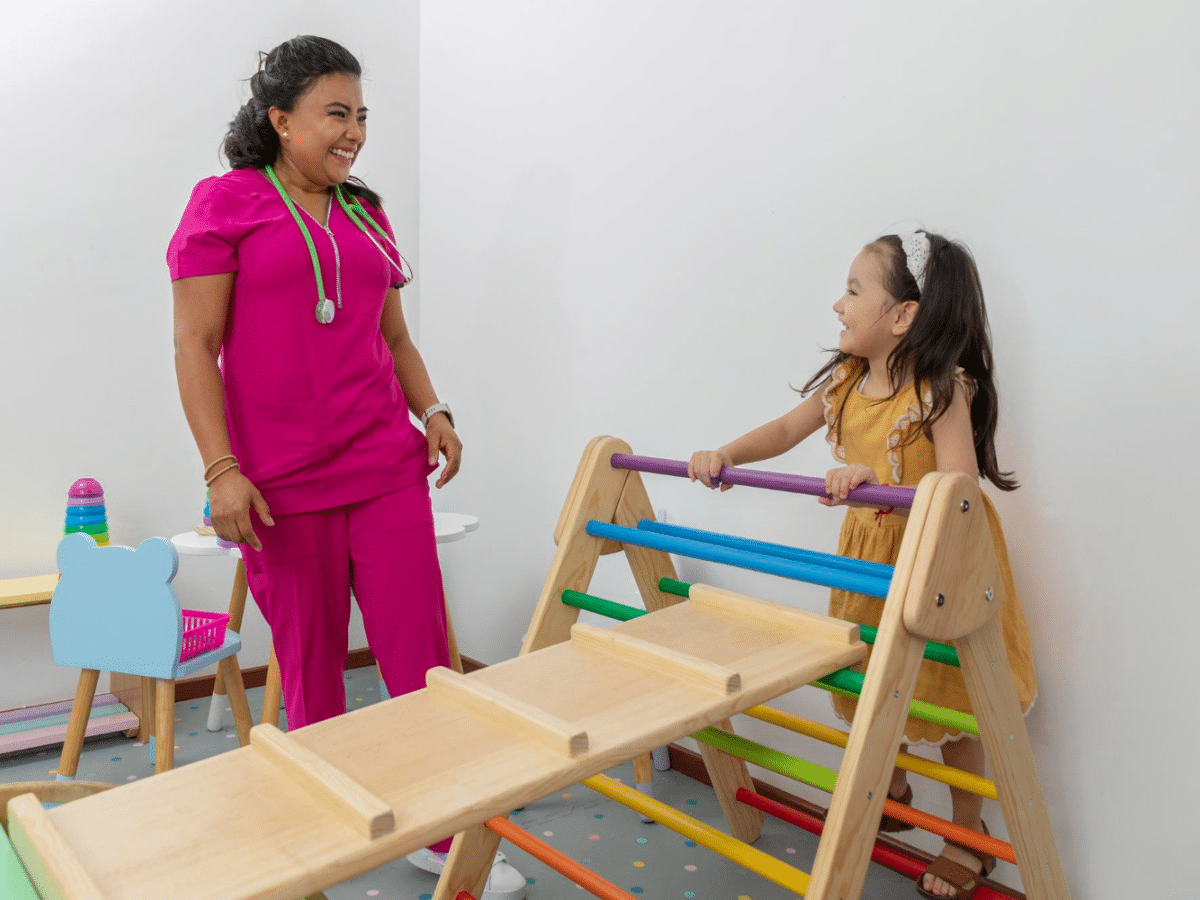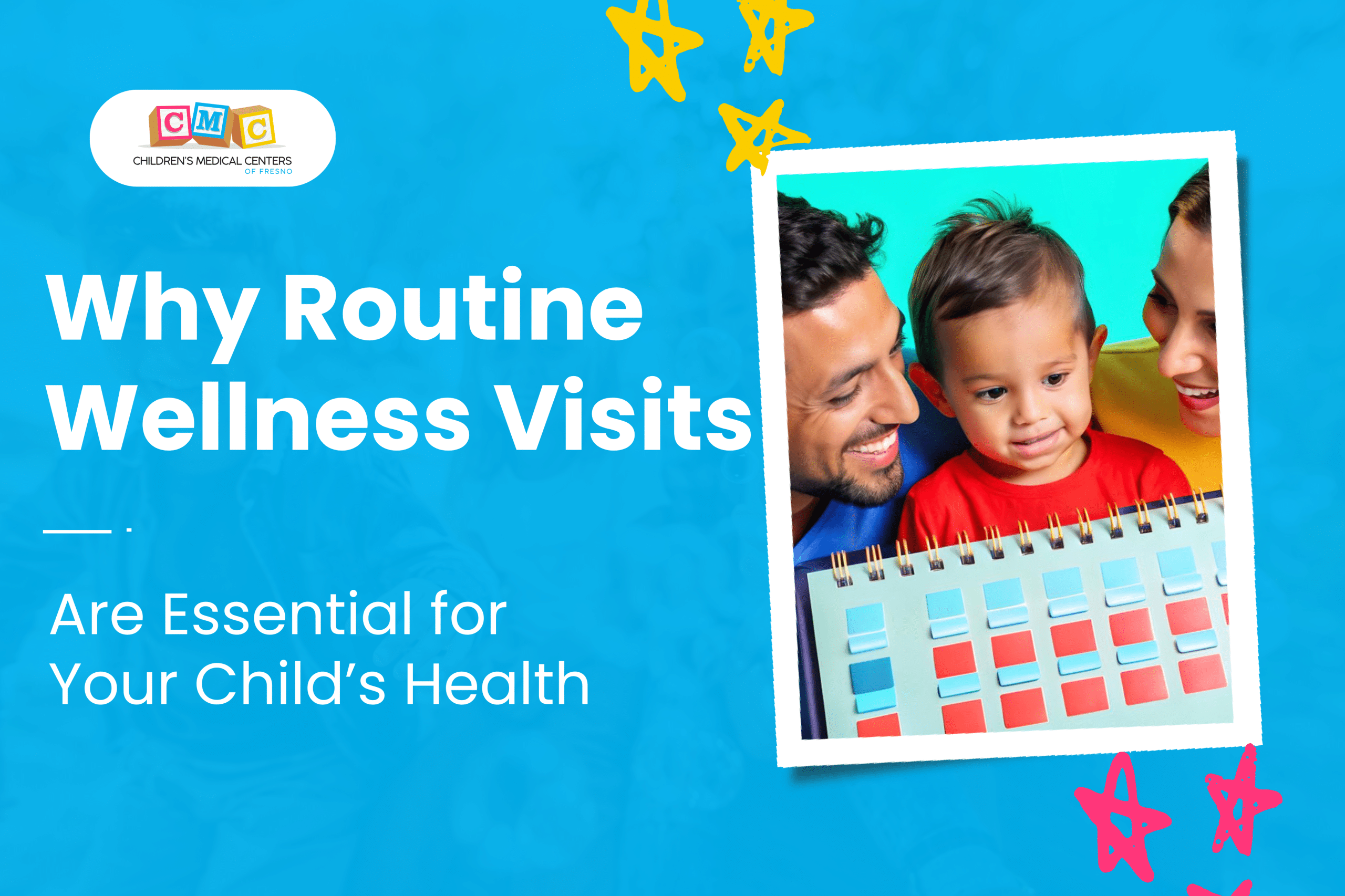Did you know that routine wellness visits for kids are one of the best ways to support your child’s long-term health?
These regular child health check-ups go far beyond a basic physical. They help track growth, spot developmental milestones (or delays), and give you a chance to talk about nutrition, school performance, and more with a trusted pediatrician who truly knows your child.
Whether your kid is just starting preschool or heading into their pre-teen, wellness visits cover it all. Plus, they’re easier to schedule than you think—dive into more details below.
Prevention is Powerful:
What Is a Wellness Visit?
A children’s wellness exam or wellness visit is a recurring check-up that helps ensure your child stays on track physically, emotionally, and developmentally.
Unlike a sick visit, which happens when your child is ill, a wellness visit is scheduled when your child is feeling well and is meant to keep them that way. When you follow a pediatric check-up schedule, your care team is less likely to overlook subtle changes or delays.
A typical wellness visit consists of:
- Growth check – height, weight, and BMI
- Review milestones – physical, emotional, and social development
- Overall exam – ears, eyes, reflexes, heart, and lungs
- Wellness review – past medical and family history
- Updating of vaccinations – based on age and schedule
- Parent and health discussion – nutrition, sleep, screen time, and behavior
The Four Benefits of Routine Wellness Visits
When you think of a pediatric wellness visit, you might picture a quick height and weight check and maybe a few questions. But these appointments offer far more than meets the eye.
Here’s why routine wellness visits for kids counts:
A. Tracking Growth and Development
Pediatric growth tracking involves observing how your child communicates, interacts with others, or solves problems. Alongside physical and cognitive development, your child’s doctor will look at these milestones to get a well-rounded view of their health.
What if they’re missing some child development milestones?
Pediatric check-ups are designed to catch delays early, not to alarm you. Early signs of conditions such as speech delays often appear subtly, so detecting those would give your child the best chance at thriving. The pediatrician can connect you with early interventions and therapies that are most effective when started young.
B. Childhood Vaccinations
Vaccines are a key part of pediatric preventive care. During your child’s wellness visits, your pediatrician will review which vaccinations are due based on age, health history, and school or daycare requirements.
Also, the pediatrician can clarify vaccine timing or how your child might feel afterward. They’re there to maintain the schedule for your kids and keep you in the loop for every decision.
C. Preventive Screenings
Issues with eyesight or hearing can sometimes be mistaken for behavior or attention problems. To catch these problems, your pediatrician may perform child hearing and vision tests during check-ups to ensure your kid can see the board at school or hear clearly in class and at home.
A pediatric health screening also covers developmental and behavioral health. Your doctor will check how your child is speaking, moving, socializing, and coping emotionally for their age.
D. Updating Records and Doctor-Family Bonding
From your baby’s first checkup to teenage concerns, continuity of care means your child isn’t starting over every visit. Consistent pediatrician visits allow your doctor to learn about your child’s medical history, personality, health patterns, and developmental journey.
Beyond records, appointments with a trusted children’s doctor can ease fears and build comfort for young patients. Over time, you and your child will feel less anxious talking about sensitive issues, such as trouble sleeping, body changes, or emotional struggles.
Addressing School and Sports Needs
A school physical exam or sports physical for children can help catch any concerns before they become barriers to learning or playing.
A back-to-school check-up includes:
- Routine vision and hearing tests to support classroom learning.
- Discussion of chronic conditions, medications, and past injuries.
- Physical assessment of your kid’s heart, joints, and mobility.
On the other hand, the sports physical involves the physician:
- Identifying underlying health issues like previous concussions.
- Checking for endurance and strength needed for safe play.
- Providing the required medical clearance forms.
When to Schedule a Visit
Pediatric check-up timing varies as your youngster grows. As a general rule, pediatricians recommend following this schedule:
- Infants: Frequent visits in the first year at the 2nd, 4th, 6th, 9th, and 12th months.
- Toddlers & Preschoolers: At the 15th, 18th, 24th, and 30th months, then once a year starting at age 3.
- School-Age Children & Teens: One annual wellness visit, which can also fulfill requirements for school or sports physicals
For extra guidance, check out the American Academy of Pediatrics checkup checklists, which outline what doctors typically review at each age—from newborn to age 9. These can help you know what to expect and prompt questions you may not have considered.
During the Visit
Share your questions and observations openly with your doctor. If you’re wondering how often a child should see a pediatrician, this is a great time to ask; your doctor can explain the ideal schedule based on your child’s health needs.
Choosing the Best Children’s Healthcare Provider Near Me
A great pediatric clinic should feel like a partner in your parenting journey, not just a place for checkups. Here are some helpful tips to guide your decision:
Why Families Choose Children’s Medical Centers of Fresno
As one of the best pediatric clinics in Fresno, we understand that your child’s health journey is personal, and every family deserves culturally sensitive care. That’s why:
- Our pediatricians are multilingual, approachable, and experienced in treating children of all backgrounds.
- We offer two convenient locations in Downtown and East Fresno, making it easier to find care close to home.
Stay One Step Ahead, One Pediatric Wellness Visit at a Time

Prevent, protect, partner—that’s what a pediatric wellness visit is all about. These routine checkups enable your pediatrician to identify health concerns early, track your child’s development, and provide personalized guidance for every growth stage.
At Children’s Medical Centers of Fresno, we make it easier for families to stay on top of routine care. Whether you need an after-hours appointment or a weekend visit, we offer telehealth and in-person options so your child never has to miss a vital check-in.
Stay proactive with experts in children’s preventive healthcare!
Don’t Miss a Milestone
Pediatric Wellness Visit: Frequently Asked Questions
1. How often should my child have a wellness visit?
After the first year, most children should have a check-up once a year. These yearly visits help ensure your child is growing and developing on track.
2. Are school and sports physicals the same as a wellness visit?
Not exactly. School and sports physicals focus mainly on whether your child is healthy enough to participate in certain activities. A wellness visit involves a full health check, developmental screening, and childhood vaccinations.
3. What vaccinations are given during wellness visits?
Vaccinations vary depending on the age and immunization schedule for kids. During wellness visits, your child’s pediatrician will make sure your child is up to date on routine vaccines (like those for measles) and optional vaccines (recommended travel shots for international trips).
4. Why are wellness visits important even if my child seems healthy?
Even if your child seems perfectly healthy, wellness visits help keep them that way. Child health check-ups let you and your child build a trusting relationship with the doctor and receive advice tailored to your child’s age.





